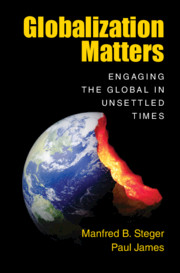Book contents
- Globalization Matters
- Globalization Matters
- Copyright page
- Contents
- Figures
- Acknowledgements
- 1 Introduction
- 2 Mapping a New Genealogy of ‘Globalization’
- 3 Rethinking the Dominant Framework of Globalization Theory
- 4 Considering the Subjective Dimensions of Globalization
- 5 Outlining an Engaged Theory of Globalization
- 6 Excavating the Long History of Globalization
- 7 Examining the Promise of Global Studies
- 8 Making Sense of the Populist Challenge to Globalization
- 9 Confronting the Global Urban Imaginary
- 10 Living in the Unsettled World of the Anthropocene
- 11 Concluding Reflections
- Appendices
- Bibliography
- Index
9 - Confronting the Global Urban Imaginary
Published online by Cambridge University Press: 01 August 2019
- Globalization Matters
- Globalization Matters
- Copyright page
- Contents
- Figures
- Acknowledgements
- 1 Introduction
- 2 Mapping a New Genealogy of ‘Globalization’
- 3 Rethinking the Dominant Framework of Globalization Theory
- 4 Considering the Subjective Dimensions of Globalization
- 5 Outlining an Engaged Theory of Globalization
- 6 Excavating the Long History of Globalization
- 7 Examining the Promise of Global Studies
- 8 Making Sense of the Populist Challenge to Globalization
- 9 Confronting the Global Urban Imaginary
- 10 Living in the Unsettled World of the Anthropocene
- 11 Concluding Reflections
- Appendices
- Bibliography
- Index
Summary
This chapter focuses on intensifying urbanization as a global phenomenon. Each year, the equivalent of two cities the size of Tokyo are built; one in six urban dwellers live in slums; and we are heading towards that black figure of 2°C global warming (the subject of the next chapter). The twenty-first century has been already called the ‘Urban Century’, supposedly leaving behind the Century of Nation-States (the twentieth century) and the Century of Empires (the nineteenth century) as prior dominant forms. While it is certainly true that urbanization has become one of the dominant global trends, this prognosis is hyperbolic, missing the tensions between different levels and forms of governance. Cities across the world are crossed by global processes of ecological pressure, economic fragility, political contestation, and cultural questioning. All of this means that the current approach to ‘global cities’ is reductive and skewed. Here, we confront a shibboleth in scholarly writing—not only has the urbanization of the world been a long-term if massively accelerating process, but it should also be said that cities have long been the locus of globalization processes.
Keywords
- Type
- Chapter
- Information
- Globalization MattersEngaging the Global in Unsettled Times, pp. 209 - 229Publisher: Cambridge University PressPrint publication year: 2019

